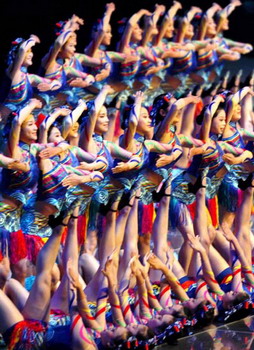
Chinese girls perform at the closing ceremony of the 10th
National Games in Nanjing yesterday. -Xinhua
The 10th National Games, a rehearsal for the 2008 Olympic Games to
be held in Beijing, closed in Nanjing yesterday after 12 days of hectic
competition.
Premier Wen Jiabao declared the Games closed at the Olympic
Sports Complex.
With the Beijing Olympics less than three years away, the
quadrennial sports meet, billed as China's mini-Olympics, was widely regarded as
a rehearsal for the 2008 extravaganza.
Host Jiangsu Province topped the
medals' standings with 56 golds, followed by Guangdong with 46 and the Chinese
Army with 44.
Six world records were broken at the Games and six others were
equalled. Five Asian records were also rewritten and another five
leveled.
The 10th Games, the largest ever in history and the first for which
the host was decided by bidding, attracted 9,986 athletes and featured 32
sports, including all 28 summer Olympic sports.
Not unexpectedly, all eyes at
the Games were on Shanghai native Liu Xiang, the most striking sports figure in
the country, who won China's first men's track-and-field Olympic gold last year
in Athens in the men's 110 meters hurdles.
"Honestly, I didn't expect to run
so fast in a domestic event. To win is the most important, though I knew I could
make it easily," said the 22-year-old after clocking 13.10 seconds to retain his
national title.
In weightlifting, a batch of fresh faces showed up while
world records were consistently bettered.
Qiu Le, 22, made a strong hit in
the men's 62-kilogram category as he hoisted 145 kg in the snatch and 177.5 kg
in the jerk for a winning total of 322.5 kg, just 2.5 kg less than what Olympic
champion Shi Zhiyong lifted in Athens.
The successful hosting of the Games
drew praise from senior officials from international sports associations.
"We
have full confidence that China is very capable of staging big sports event. We
are very confident that the 2008 Olympic Games will be a great success," said
International Olympic Committee (IOC) President Jacques Rogge.
"The
organizing job here has been excellent, and it reveals that the Beijing Games
would be as good or even better," added Francois P Besson, sports director of
the International Judo Federation after supervising the Games' judo
competitions.
Yet, doping and match-fixing scandals as well as refereeing
controversies tainted the Games.
The women's over 78-kg class judo final had
to be held again after Olympic champion Sun Fuming of Liaoning deliberately lost
to her provincial teammate Yan Sirui, who represented the Chinese Army at the
Games.
The match-fixing incident resulted from a regulation especially
designed for the Games, aimed at promoting exchange of athletes between
provincial teams and the army team.
According to the regulation, if an army
athlete wins at the Games, the gold medal will also be counted for his/her
native province.
Liu was given a warning after Yan won the rematch and
reclaimed the title.
And in the taekwondo competitions, the mat was
overshadowed by a flurry of walkovers as 34 out 148 matches were not played
while in cycling, a bronze medalist refused to step onto the podium in protest
over a disputed result.
The Games also smelt out drugs as star distance
runner Sun Yingjie was stripped of her silver medal in the women's 10,000 meters
after failing a dope test.
The 11th National Games will be held in Shandong
Province in 2009.



